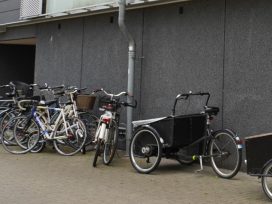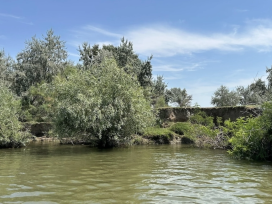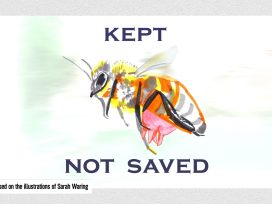Grave matters
Death plays a key role in most religions, moral systems, and legal constructs. Although a heavy topic, talking about it is all the more important to process the grief that it causes. We cover burials, community, and ecology on this grave episode of Standard Time, premiering at 5 PM CEST.
Throughout human history, death has always been heavily ritualized, and has always occupied our imaginations. The universal emotion of grief is felt by all, and expressed differently across cultures and religions. Throughout East Asia and the Mediterranean, professional mourners are hired to accompany the dead person’s family and community, whereas in places like Indonesia, crying is not encouraged, and many rituals around the world choose to celebrate the deceased person’s life through joy and dance instead, or even in spite of the pain of their loss.
You may also listen to the show in podcast format on CBA, on across any of the usual podcast aggregators by searching for Standard Time talk show:
Throughout Europe as well, rituals surrounding grief and mourning vary; from the solemnity of a Catholic funeral in Italy to the joyous celebrations of life in Spain’s Day of the Dead, the continent embraces a wide spectrum of approaches to bid farewell to loved ones. In Germany, cremation is a common practice and is seen as a form of natural burial – even though many activists draw attention to its high emission levels of both CO2 and toxic fumes.
There is a growing movement towards more nature-friendly technologies, reflecting a shift in European attitudes towards death and the environment. Instead of elaborate coffins and heavily polluting embalming chemicals, some people choose biodegradable materials and eco-friendly practices, allowing their bodies to return to the earth in a harmonious cycle of life and death.
Death is also an economic question, as most burial practices are extremely expensive, and their financing can sometimes bankrupt grieving families.
Within the EU’s confines, mourning and bereavement are contested topics. The peril of refugees trying to make their way into Europe has flooded Mediterranean shores with unforeseeable amounts of dead bodies, prompting people to ask the question: are all lives seen as worth the same? Are we equal in death?
Some bodies are contested for other reasons – LGBTQIA+ funerals address a gap between one’s lived reality and the heteronormative rituals of conventional burials.
Today’s guests
Yvonno Leeb buries and lectures on the topics of process-oriented burials, caring for the dead, as well as queer death. They have been working in funerals since 2019 and helped design the undertaker training program in the Berlin-based non-profit organization Kultur Trauer offering educational and cultural programs on death. They are also one of the co-founders of Tamo Burials in Vienna.
Anastasia Smirnova recently received her MA in architecture from the University of Applied Arts Vienna, working on her project Circumitus. The initiative places small pavilions at the Vienna Central Cemetry to support grieving individuals, and to introduce fresh rituals that alter our traditional perceptions of cemeteries.
Stefan Dinges is a theologian, consultant, mediator, and medical ethicist at the Institute for Ethics and Law in Medicine at the University of Vienna. He is part of the team at Letzte Hilfe Österreich, providing courses to the public on end-of-life assistance and care for the dying.
Originally an architect and interior designer, Noémi Ambrózy changed her career path after becoming a mother of two hearing-impaired children. She is a certified Grief educator and instructor at Hand in Hand Parenting. As a professional, she works with the losses and specific challenges of everyday life through inner strength and community building. She is representing the Hungarian Solar Eclipse Association, whose main objectives are to help the bereaved and research issues on grief.
We meet them at the Alte Schmiede Kunstverein in Vienna.
Sources
Death and dying: how different cultures deal with grief and mourning by John Frederick Wilson, The Conversation.
Why Danish Parents Like to Talk About Death by Jessica Joelle Alexander, Time.
Why doesn’t Europe grieve deaths in the Mediterranean? By Heidi Mogstad, Aljazeera.
Exploring Common Funeral Rituals Around The World, Simple Alternatives.
Funerals Around the World Series: Europe, Security National.
Creative team
Réka Kinga Papp, editor-in-chief
Merve Akyel, art director
Szilvia Pintér, producer
Zsófia Gabriella Papp, digita producer
Salma Shaka, writer-editor
Priyanka Hutschenreiter, project assistant
Management
Hermann Riessner, managing director
Judit Csikós, project manager
Csilla Nagyné Kardos, office administration
OKTO Crew
Senad Hergić, producer
Leah Hochedlinger, video recording
Marlena Stolze, video recording
Clemens Schmiedbauer, video recording
Richard Brusek, sound recording
Postproduction
Milan Golovics, dialogue editor
Nóra Ruszkai, video editor
István Nagy, post production
Art
Victor Maria Lima, animation
Cornelia Frischauf, theme music
Captions and subtitles
Julia Sobota, Daniela Univazo, Mars Zaslavsky, Marta Ferdebar, Olena Yermakova, Farah Ayyash
Hosted by the Alte Schmiede Kunstverein, Vienna
Disclosure
This talk show is a Display Europe production: a ground-breaking media platform anchored in public values.

This programme is co-funded by the Creative Europe Programme of the European Union and the European Cultural Foundation.
Importantly, the views and opinions expressed here are those of the authors and speakers only and do not necessarily reflect those of the European Union or the European Education and Culture Executive Agency (EACEA). Neither the European Union nor the EACEA can be held responsible for them.

Published 30 May 2024
Original in English
First published by Eurozine & Display Europe
© Standard Time / Eurozine / Display Europe
PDF/PRINTNewsletter
Subscribe to know what’s worth thinking about.
Related Articles

From getaway destination to point of entry, the EU’s southernmost territories attract plenty of ongoing arrivals. Migrant containment policies, outlining stringent confinement and processing, would see newcomers restricted to the archipelago. But could Spain’s swift transfers and regularization turn the tide of migration strategy?

Denmark’s neglected areas of urban social housing are up for regeneration. But Copenhagen’s demographic diversification plans threaten to ostracize the very communities ghettoized within the city’s ‘imaginary borders’ – immigrants fear expulsion at the hands of gentrification.





